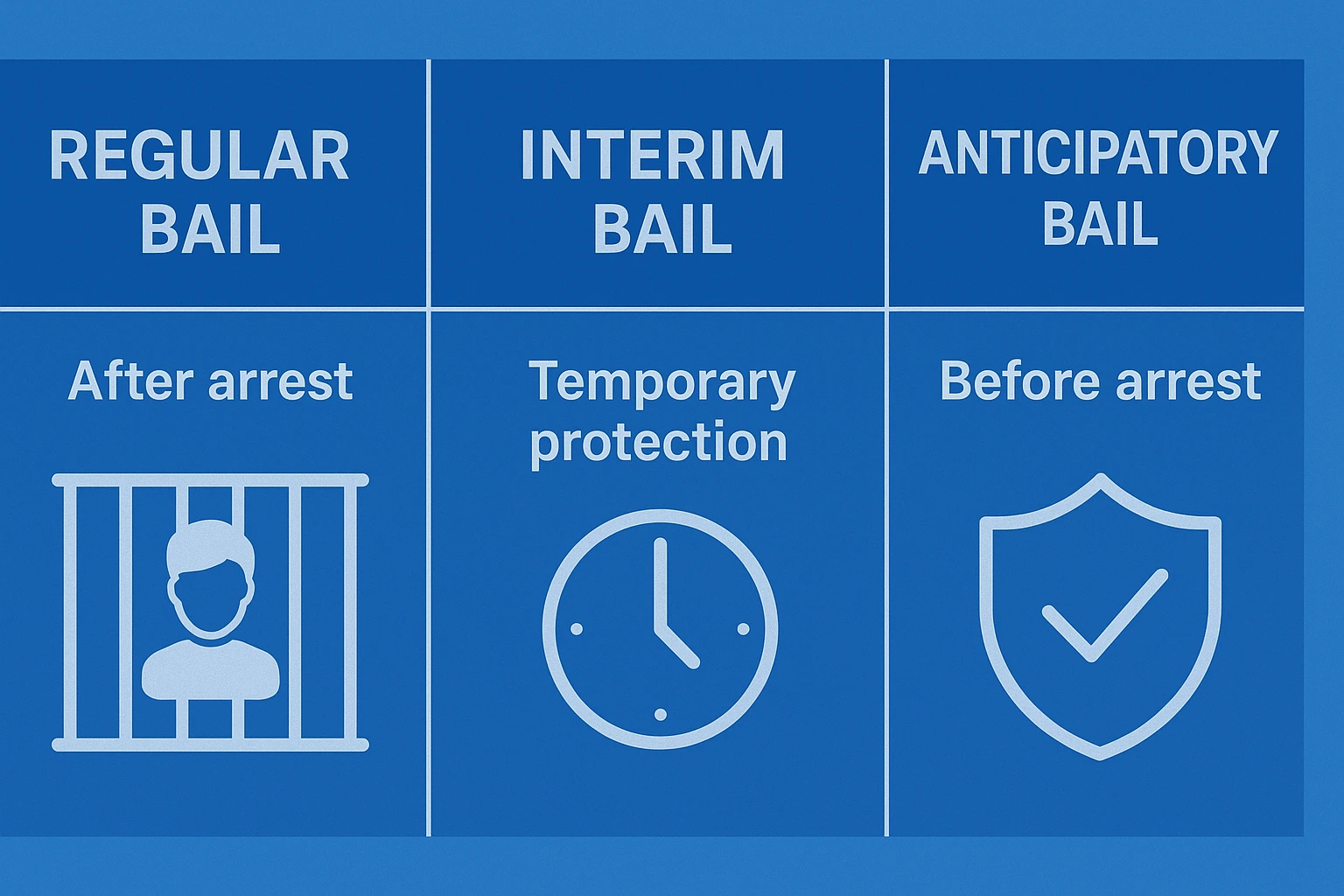
How to Get Bail in Non-Bailable Offences: Complete Guide
Getting bail in a non-bailable offence is one of the most challenging situations in criminal law. Unlike bailable offences—where bail is a right—non-bailable offences require you to convince the court that you deserve bail based on facts, law, and circumstances.
This complete guide explains the process, legal provisions, documents required, grounds for bail, court principles, and practical tips to increase your chances.
1. What Are Non-Bailable Offences?
Non-bailable offences are offences where bail is not granted as a matter of right. Instead, the accused must apply for bail and the court has complete discretion to approve or reject it.
Examples include:
-
Murder (Sec. 302 IPC)
-
Rape (Sec. 376 IPC)
-
Kidnapping (Sec. 364 IPC)
-
Attempt to murder (Sec. 307 IPC)
-
Dowry death (Sec. 304B IPC)
-
NDPS offences
-
Serious economic offences
In such cases, courts examine whether granting bail may affect the investigation, threaten witnesses, or allow the accused to flee.
2. Which Court Grants Bail in Non-Bailable Offences?
Depending on the stage of the case, bail may be sought from:
1. Magistrate Court
Power to grant bail in non-bailable offences except those exclusively triable by Sessions Court.
2. Sessions Court
Handles serious offences and is the primary court for bail after arrest.
3. High Court
If Sessions Court rejects bail, you can apply under Section 439 CrPC.
4. Supreme Court
Final remedy under Article 136 (Special Leave Petition).
3. Types of Bail in Non-Bailable Offences
1. Regular Bail (Sec. 437 / 439 CrPC)
For accused already arrested and in custody.
2. Anticipatory Bail (Section 438 CrPC)
Pre-arrest bail to avoid custody.
3. Interim Bail
Temporary protection until final hearing.
4. Default Bail (Sec. 167(2) CrPC)
If charge sheet not filed within 60/90 days.
4. Legal Procedure to Get Bail in Non-Bailable Offences
Step 1: Hire an Experienced Criminal Lawyer
Drafting, strategy, and argument make a significant difference.
Step 2: Prepare the Bail Application
A bail application must include:
-
FIR number
-
Offence sections
-
Arrest details
-
Role of the accused
-
Case facts
-
Grounds for bail
-
Lack of criminal history
-
Cooperation with investigation
-
Documents supporting innocence
Step 3: Filing the Bail Petition
If Accused Is Arrested → File Regular Bail
Before the Magistrate → if rejected → apply to Sessions Court → then High Court.
If Arrest Is Anticipated → File Anticipatory Bail
Before Sessions Court → if rejected → apply to High Court.
Step 4: Court Hearing
During the hearing:
Your Lawyer Will Argue:
-
You are falsely implicated
-
No recovery from you
-
No direct evidence
-
You have strong roots in society
-
No criminal background
-
You will cooperate fully
-
You won’t threaten witnesses
The Prosecution Will Oppose Bail If:
-
The offence is grave
-
Recovery is pending
-
You may abscond
-
You may tamper with evidence
Judge May:
-
Ask questions
-
Call for case diary
-
Request a status report from police
-
Reserve order
-
Grant or reject bail
5. Important Grounds for Bail in Non-Bailable Offences
Courts consider the following grounds very seriously:
Ground 1: Weak or Insufficient Evidence
If allegations are based on:
-
Suspicion
-
Hearsay
-
Contradictory statements
-
Circumstantial evidence
The court may grant bail.
Ground 2: No Criminal History
First-time offenders get relief more easily.
Ground 3: False Implication
Common in personal, political, family, and property disputes.
Ground 4: Delay in Trial
If the trial is slow or prosecution is delaying witness examination, bail becomes likely.
Ground 5: Medical Grounds
Serious illness of the accused or their dependent family members.
Ground 6: Minor Role in the Offence
If the accused has no major involvement or no recovery from them.
Ground 7: Lack of Recovery
If nothing is recovered from the accused, courts consider bail favourably.
6. Factors Courts Check Before Granting Bail
Courts balance personal liberty with public interest and check:
-
Gravity of the offence
-
Evidence strength
-
Chances of absconding
-
Risk of tampering evidence
-
Likelihood of repeating the offence
-
Previous criminal record
-
Nature of allegations
-
Conduct during investigation
These principles come from landmark SC judgments like Arnesh Kumar, Sanjay Chandra, Gurbaksh Singh Sibbia, etc.
7. Bail Conditions Imposed in Non-Bailable Offences
If bail is granted, conditions may include:
-
Not leaving India without permission
-
Passport surrender
-
Visiting police station periodically
-
Avoiding contact with witnesses
-
No similar offences
-
Submission of sureties
Violation may lead to cancellation of bail.
8. Cost and Time to Get Bail in Non-Bailable Cases
Time Required
-
Magistrate: 1–7 days
-
Sessions Court: 1–2 weeks
-
High Court: 2–6 weeks
-
Supreme Court: varies
Cost
Depends on lawyer experience and court complexity. Serious offences cost more.
9. What If Bail Is Rejected?
You can:
-
Apply to a higher court
-
Reapply on fresh grounds
-
Seek interim or temporary bail
-
Challenge improper arrest
10. Practical Tips to Improve Bail Chances
-
Never hide facts from your lawyer
-
Prepare a clean bail strategy
-
Cooperate with investigation
-
Maintain good character reference
-
Avoid discussing the case with anyone
-
Appear in court on every date
Conclusion
Getting bail in a non-bailable offence requires a strong legal approach, solid grounds, and proper documentation. Courts examine each case carefully, but they also protect personal liberty—so a well-prepared bail application stands a very good chance.



Comments (0)